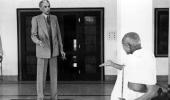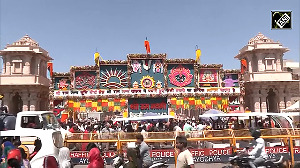'Whatever you do will spark controversies, so it is best do what your heart tells you to do. Simple.'

Nikkhil Advani's new Web series Freedom at Midnight is based on Larry Collins and Dominique Lapierre's 1975 book set in the last year of the British Raj. He started scripting around three-and-a-half years ago, telling the events from August 16, 1946 to January 30, 1948.
Starring Sidhant Gupta, Ira Dubey, Arif Zakaria, RJ Malishka and Chirag Vohra, the series will stream on SonyLIV from November 15.
"You surround yourself with people ready to jump off the cliff with you hoping the parachute will open," Advani tells Rediff.com Senior Contributor Roshmila Bhattacharya.
How old were you when you read Freedom of Midnight for the first time?
I would imagine I was 16 then, studying in the 10th standard, and the characters just jumped at me, transporting me back in time to the conversations in the viceroy's office, among members of the Congress and the Muslim League in the last year of the British Raj.
Larry Collins and Dominique Lapierre are visceral writers, so the book is not a dry retelling of history but very evocative.
I remember choking up with emotion at various points as I read about a major in the army or a refugee uprooted from his home in Rawalpindi, characters who are not even central to the narrative.
I have read the book several times since, right up to the time I decided to bring it to the screen.

Was the experience different when you were reading it as someone wanting to film it?
Well, yes. Earlier, I was enjoying the storytelling like any reader. But four years ago, when I took on the responsibility of turning a favourite book of many into an OTT series, I read it with more purpose and focus.
I had to decide how to adapt this vast story, what to keep and what to discard.
I had to set the tone and literally break the book down into episodes and seasons.
Eventually, we decided to tell the events as they happened from August 16, 1946, Direct Action Day, till January 30, 1948.
Even then, it was not simple because 77 years later, we have the powerful tool of retrospect.
We know now that Muhammad Ali Jinnah was dying, but the leaders of the Congress possibly weren't aware as he had hidden his lung X-ray report.
Had they known, maybe they would have not agreed to his demand for a a separate nation for Indian Muslims and the Partition would not have happened.
I want to take my audience into rooms where these difficult, life-altering decisions were taken, simulate the pressure these guys were under when making them based on what little information was available to them at the time.
When did you start scripting?
Abhinandan Gupta and I, with Gundeep Kaur, Adwitiya Kareng Das, Ethan Taylor, Revanta Sarabhai and Divya Nidhi Sharma, started scripting three-and-a-half years ago.
Danish Khan and Sauguta Mukherjee, head and content head of SonyLIV, offered their own inputs, both being big fans of the book themselves.

What were the most difficult scenes to write and shoot?
The exodus scenes were the most difficult.
Thirty million people were uprooted by Partition while we were working with around 1,000 junior artistes at the most and had to rely on visual effects and the magic of cinema to recapture those scenes of mass migration.
Another challenge was matching the faces of the actors with those of the refugees in the iconic photographs we had grown up seeing, faces which had turned hard from all the suffering they had endured.
We shot these scenes over four days, two in a desert in Rajasthan, at temperatures of 50 degrees Celsius, many actors fainting in the heat.
This was followed by another two days on a railway set and half a day outside Patiala in Punjab.
All our shoots were in temperatures of 40-42 degrees Celsius, with Delhi recording 52 degrees when we were filming there.
Even the casting of the principal characters like Gandhi, Nehru, Patel, Jinnah, Fatima Jinnah and the Mountbattens must have been tough since they are familiar faces too.
Yes. Usually during the casting, a director sits with his ADs, the casting director and his assistants, and possibly the producer to consider the choice of acting before them. But in this instance, the final call was Jagdish Dada's, my hair, make-up and prosthetics expert.
So when I thought Chirag Vohra, whose work as an actor I love and who is Gujarati, was perfect to play Gandhi, I had to wait for Dada to tell me if he could make him look as close to Gandhi as is possible.
With some actors he would take an hour or two, with others it was longer.
I also didn't want my actors to do any other work for a year-and-a-half as I was clear I couldn't have my Gandhi, Nehru or Sardar Patel be seen in another show in which they were playing characters diametrically opposite.

Arif Zakaria, who plays Muhammad Ali Jinnah, must have taken the least time in hair, make-up and prosthetics?
Yes, Arif's face is pretty gaunt and his colour is correct too.
He resembled Jinnah from the photographs we were working with.
Ira Dubey was also perfect as Fatima Jinnah.
For the Jinnahs, I needed actors who looked westernised as both were Malabar Hillies partying with the Parsis of South Bombay.
Which actor took the longest time to get ready?
I would say Sidhant Gupta, who plays Jawaharlal Nehru.
Every day, for the 55-60 days he was shooting with us, Sidhant spent four hours in prosthetics from the time he arrived on the set.
We Indians usually have a bulbous nose, what Jadish Dada calls a 'pakora nose'.
He jokes that with prosthetics you can increase a nose, but to decrease it, you need plastic surgery.
He was very particular that the actor playing Nehru had to have a sharp nose.

All these challenges must have made the show overwhelming for you as its creator-director?
Actually, directing two seasons of Mumbai Diaries, and being the showrunner on Rocket Boys, had prepared me for Freedom at Midnight.
In long form, you don't shoot in chronology. When at a particular location, you film scenes from episode two, episode seven, episode 15.
So, you surround yourself with people ready to jump off the cliff with you hoping the parachute will open.
My HoDs were committed to my vision and helped me execute it.
Any form of art today will bring along some controversies, some repercussions. Doesn't that worry you or the channel?
The answer lies in your question.
Whatever you do will spark controversies, so it is best do what your heart tells you to do. Simple.

We've already had a tweet from Vivek Agnihotri based on the trailer accusing you of whitewashing or gaslighting history, pointing out that if you're going to present the violent, communal, history of Partition, you should at least show who was the perpetrator and who was the victim.
When he tweeted, the trailer had not been released. He was reacting to an article.
Yeah, well, he further reiterates in the tweet that this wasn't just a riot. It was a Hindu genocide, and it had a religious colour: green. Second, the violence was driven solely by religion, and the name of that religion was Islam. Hindus never asked Muslims to leave India, he states.
I am not on Twitter and all I can tell Vivek is to watch the show now.
The Constitution of India allows everyone the freedom of expression, that's our fundamental right.
In the show, we are talking about Babasaheb Ambedkar and the drafting committee of the Constitution too who allowed the citizens of this country to defend and criticise.
My request to all would be, 'Ek baar dekh lo, phir discuss karte hain.'












 © 2025
© 2025